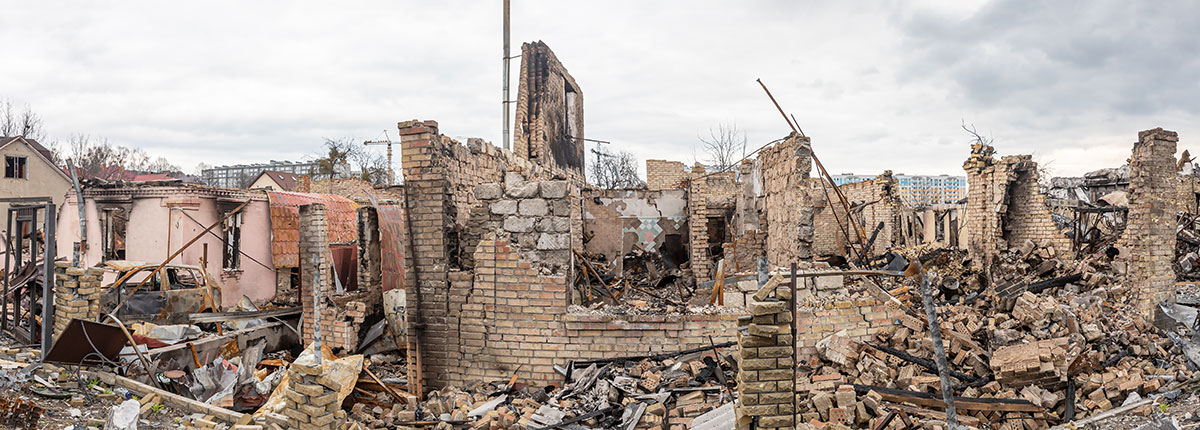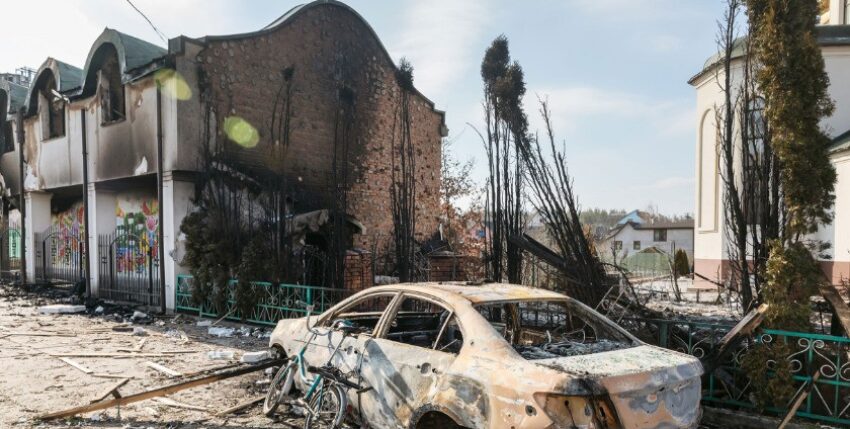During our research, we repeatedly come across topics that do not have a direct maritime connection, but nevertheless - or perhaps precisely because of this - become part of our journalistic horizon. The ongoing land war in Ukraine as a result of the Russian invasion at the end of February 2022 should not only be viewed in terms of its impact on the global economy, energy and grain supply, but also in terms of people's experiences and, not least, their suffering. We would therefore like to refer to the following article on a dialogue between Tom Nichols and Nick Gvosdev (both of whom taught at the U.S. Naval War College) in the North American publication The Atlantic about the reasons for the brutal behaviour of the Russian armed forces towards the civilian population in Ukraine:
Why the Russian military is brutalising Ukraine
About resentment and betrayal
From Tom Nichols
War is always a brutal business, but why is the Russian military so determined to inflict civilian damage on neighbouring Ukraine? I spoke to another Russia expert.
Run amok
I spent years teaching military officers who served in conflicts around the world. I am not naive about the viciousness of war, and I am grateful that it has never befallen me. But I am appalled by the sheer sadism of Russia's war against Ukraine. Russia's armed forces are engaging in actions such as levelling cities, deliberate attacks on civilian targets and other obvious war crimes that we would associate with a war of annihilation.
I turned to a friend, also an expert on Russia, to question this more thoroughly. Nick Gvosdev has a Ph.D. in Russian history from the University of OxfordHe and I worked together for many years on the U.S. Naval War College taught. (He still teaches there, and his comments here are his personal views and not those of the US government). We are both Eastern Orthodox Christians ourselves, which adds a particularly painful aspect for us to this immense tragedy. We have had many conversations about the war, the latest of which I now offer to readers trying to understand this terrible conflict.
Tom Nichols: Nick, international relations experts will elaborate on the "great power" dimensions of this war, but why is the conflict so brutal at the level of actual fighting? Is it really enough to say that the Russians were merely reacting to the humiliation of defeat almost from the start?
Nick Gvosdev: To a certain extent. At all levels of Russian society, from the taxi driver on the street to the Kremlin insider, there was a strong belief that the Russian forces would be welcomed as liberators, especially in the Russian-speaking areas of Ukraine. In fact, the original Russian military plan was based on the assumption that Ukrainian soldiers would refuse to fight and Ukrainian politicians would defect. However, this was not the case. Even more strikingly, the two largest Russian-speaking cities in Ukraine - Kharkiv and Odessa - proved to be focal points for the successful defence against the Russian invasion.
Nichols: The last point seems to be important.
Gvosdev: Yes, Western Ukraine - at least those areas that were part of the Habsburg Empire and were never under Russian imperial rule - emphasised its difference from the Russians and was always the heartland of Ukrainian nationalism. But almost all the atrocities we have seen have been directed against people precisely in those parts of Ukraine that are part of the Russian-speaking world. There seems to be a strong undercurrent to give these "traitors" their due reward.
Nichols: I don't think this is fully understood in the West. The massacre in Bucha, for example, was directed against Russian-speaking people - almost as if they made the Russians more angry than Ukrainian nationalists.

Gvosdev: Bucha was certainly a particular target, as it served as a dormitory town for Ukrainian government employees and military officers. But this is all a direct result of the appropriation of a World War II narrative in which the Ukrainian government is routinely described as a Nazi regime and that those fighting against the Russians are fascists. Meanwhile, Russian social media routinely uses the term "Allied Forces" to describe the Russian military and the militias of the Donetsk and Luhansk republics - with all the World War II connotations that description carries. So think about it: If the Ukrainian military and government are the modern-day successors to the Nazis, then of course no quarter should be given to those who fight on the side of the fascists - and especially those who betrayed their relatives.
Nichols: What about the Russian military? Is there something in their training and background that makes them harder to control? They certainly haven't improved in their effectiveness as a fighting force since the Soviet days.
Gvosdev: Russia has tried to create a professional army of volunteers, but it still lives with the "traditions" from the Soviet era, including the brutalisation of its own recruits - the so-called "dedovshchina" - and a strictly hierarchical command structure. Add to this the ongoing problem of corruption within the military, and they create an ethos in which it is more advantageous to brutalise others than to be affected by it themselves. Another point: the Kremlin is keen to avoid general mobilisation, and so a number of Russian soldiers now fighting in Ukraine chose military service over prison - as the US did during the Vietnam War.
Nichols: I almost didn't believe it when I saw it.
Gvosdev: Worse still, the Russians also rely on mercenaries and militias, and this is another group in which people with criminal records can end up. In many cases, the atrocities were the result of some of these people being allowed to run amok - except that they were simply given general orders to punish "traitors" and eliminate "Nazis" without any special supervision or discipline from above.
Nichols: In contrast, Ukraine has found that a solid and reliable corps of NCOs works wonders in the field.
Gvosdev: Absolutely. Ukraine's military reforms to NATO standards in recent years have also enabled its military to carry out more decentralised operations.
Nichols: It seems that resentment is the strongest "force multiplier" in the Russian military: You betrayed us, you live better than us, you elected your own government, so ... you are Nazis, consequently we can do to you what we already did to them in World War II.
Gvosdev: This is the logical outcome - and how to move from "brothers and sisters" to all-out carnage. From the Russian point of view, Ukraine has turned its back on its brother Russia and driven a sword into the heart of the "Russian world" by trying to integrate into the Western world. Russian politicians and experts deal with these issues every day. This narrative of "betrayal" is linked to the general Russian resentment towards Europe and the West. Some of it is certainly related to living standards, but it is also driven by the feeling that Europeans - and now Ukrainians - look down on Russia as not quite European, definitely not Western and perhaps not even civilised. And this resentment leads to a Russian determination to let others share in Russia's misery, be it by bombing Ukraine or by triggering an energy and economic crisis in the rest of Europe. [Editor's note meerverstehen: And a worldwide famine.]
Nichols: I sense an unpleasant parallel here with events in the USA and some other countries.
Gvosdev: Dhe politics of resentment is always the gateway to legitimising anger and thoughtless rage - and ultimately violence - against those who are considered traitors or evildoers, as a justified reaction of those "looked down upon", so to speak. However, the Russians do not have a monopoly on this in the world.







